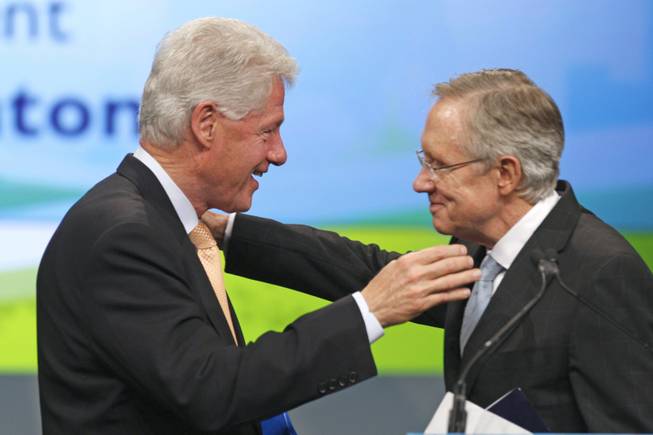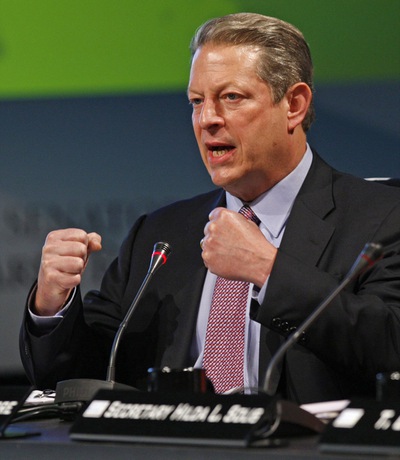
Former President Bill Clinton is greeted by Senate Majority Leader Harry Reid on Aug. 10 at the National Clean Energy Summit 2.0 at UNLV.
Friday, Aug. 14, 2009 | 3 a.m.
Four years after former President Bill Clinton challenged the Las Vegas business community to lead the nation in conservation and renewable energy, he challenged the rest of the nation.
“Let’s take what Nevada is doing and put it on steroids,” he said.
Clinton was the keynote speaker at the National Clean Energy Summit 2.0 on Aug. 10 at UNLV’s Cox Pavilion. He also participated in last year’s summit at the university.
The summit featured billionaire oil man T. Boone Pickens, former Vice President Al Gore, Senate Majority Leader Harry Reid and Clinton White House Chief of Staff John Podesta.
Speaking to the Nevada Development Authority four years ago, Clinton said: “If I were the economic development czar for America today or if I were in charge of economic planning for Las Vegas and Nevada today, I would start by making a complete and total commitment to a clean energy future because I think you can create more jobs there than anywhere else.”
Although Las Vegas’ jobless rate hit 12.3 percent in June and long ago surpassed the national rate of 9.4 percent, several renewable energy companies have either announced intentions to build Nevada power plants or have done so.
Speaking to the media after the summit, Reid said Nevada is not yet the solar capital of the world. “But we’ve done pretty darn well. We could do better, but frankly, Nevada has to compete with other states that are getting better incentives.”
Some remain skeptical. Protesters gathered in front of UNLV to decry the push for an overhaul of the national energy policy. Clinton likened those protesters to those speaking against reforming the U.S. health care system because they think an overhaul is not feasible.
“We are still working on demonstrating to the naysayers that this can be good economics,” he said, later adding, “We have to convince people that this is an economic winner ... The main reason people argue against this is the total absence of parallel financing. The best solution of all is clearly nationwide decoupling.”
Decoupling allows utilities that promote renewable energy or energy efficiency programs to recoup losses made by lower output.
Clinton said the cash for clunkers program, an incentive for consumers to exchange their older, less efficient automobiles for those with better gas mileage is an indication that “the American people will bite if it makes good economic sense.”
The former president promoted the creation of a small-business loan equivalent to help companies get started in the green energy movement.
“We’ve got to find a way to unlock that,” he said. “We’ve got to get banks involved in this and to quit piddling around.”
“While some things have been done ... in a country that has lost 7 million jobs, we’re still playing with this,” he said. “We need to figure out how to do this on a national scale and show how it’s done on an international scale.”
Throughout the summit, upcoming energy legislation was promoted, with Reid promising a bill this year.
When asked by In Business Las Vegas whether health care or energy would take priority, Reid said that Congress will finish health care, then energy.
He said energy legislation needs to be a package: smart grid “superhighway” transmission, renewable energy, efficient appliance programs, increasing use of U.S.-based natural gas and improved battery use.
A call for energy efficiency and renewable energy was sounded, including refitting buildings to cut energy waste and carbon dioxide output.
“We need to not only change the lights and the windows, we need to change the laws,” Gore said during a round-table discussion by industry, labor and policy leaders.
Podesta said retrofitting 70 percent of homes in the U.S. will create 650,000 sustainable jobs in construction and manufacturing.
Texas oil man Pickens has spent $60 million to promote wind energy, natural gas and home weatherization.
“My time is running out. I’m 81 years old,” he said. “I had to do something.”



Join the Discussion:
Check this out for a full explanation of our conversion to the LiveFyre commenting system and instructions on how to sign up for an account.
Full comments policy